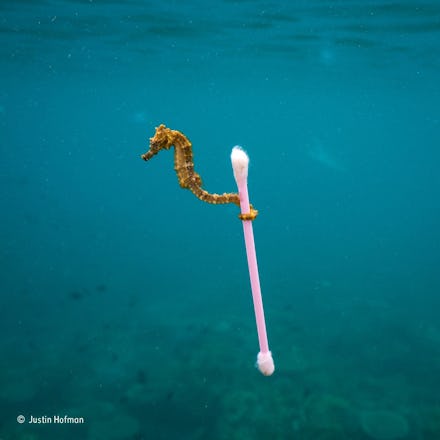Justin Hofman’s viral sea horse photo shows the heartbreaking state of our polluted water

The world’s oceans are going to have more plastic in them than fish by 2050, according to World Economic Forum projections. But we don’t need to wait for the future to witness grim scenes of polluted waters.
Just look at the photo below. Photographer Justin Hofman caught a tiny sea horse latched onto a cotton swab along the coast of Sumbawa Island in Indonesia, one of one of the most biodiverse nations in the world.
“After 10 minutes, the tide started to turn and all this junk started to flow through,” the 33-year-old said in a phone call from Monterey, California. “It first grasped onto a piece of sea grass, then there was a little wispy piece of plastic that it grabbed onto, and the next thing it was this Q-tip. It was this weird progression of going from natural to unnatural in this short span.”
Hofman said that he was “surprised at how good the coral” in the area was, but the waters were otherwise heavily polluted. The white blurry spots in the photo’s background are actually bits of plastic drifting around, and the water started to stink as sewage came through (which he thinks made him sick the next day).
Seahorses are used to clinging to various natural objects in the ocean, like plants or coral. But as the world continues to dump plastic waste into waters with precious biodiversity, this may be the new normal.
Earlier this year, the Indonesian government committed up to $1 billion a year to cleaning up its oceans. But the problem isn’t just in Indonesia — it’s everywhere. Hofman has traveled the world showing people rare, endangered creatures with hopes that it and his photographs along the way can lead to better wildlife conservation.
“I was just in the Arctic a couple weeks ago and we watched a polar bear dig through trash and eat plastic. It was pretty heartbreaking stuff,” he said. “I’ve seen dynamite fishing, shark fishing, starving polar bears, whales caught in nets... a lot of depressing shit.
“I do truly feel like I carry this weight sometimes,” he added.
The Oceanic Society recommends recycling, joining in on beachside cleanups and avoiding single-use plastics or microbeads to help curb the damage that’s being done to the world’s oceans. It also suggests supporting local bans on single-use plastics, including containers and bottles.
Hofman’s photo was a finalist in the Wildlife Photographer of the Year competition at the Natural History Museum in London. He may not have won the whole thing, but his image has gained incredible traction on the internet, perhaps because it strikes a balance between innocence, adorable and tragic.
“I’ve gotten some incredible messages from people all over the world and the response has been incredible. I just hope everybody’s attention span is long enough to make [real change] happen,” he said. “I hope so — I hope this resonates with people. It definitely resonates with me: I have been thinking about this photo ever since I took it, and that was last December.”